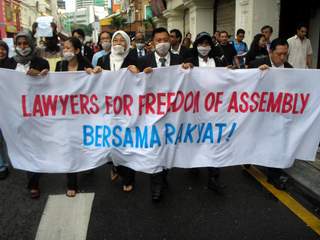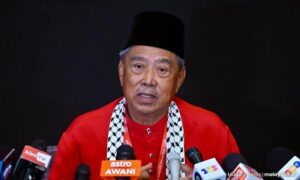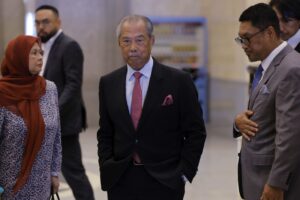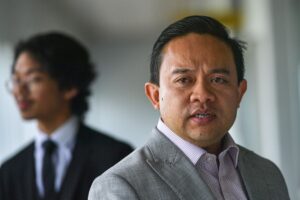By S. Pathmawathy | Malaysiakini
The Kuala Lumpur Sessions Court has acquitted seven people, including four lawyers, for participating in an alleged illegal human rights march two years ago.
Sessions judge SM Komathy Suppiah said the prosecution had failed to prove its case against the seven of breaking the law.
They were also freed from two alternative charges of participating in an illegal assembly and disobeying police orders to disperse.
With this decision, the seven were not required to enter their defence.
The four lawyers in the dock were R. Sivarasa — who is also Subang parliamentarian — N. Surendran, Latheefa Koya and Amer Hamzah Arshad.
The others were Nooraza Othman, Johny Anbu @ Abu Bakar Adnan, and Eric Paulsen.
Both the acquitted lawyers and activists, who cheered on hearing the court’s decision, hoped that the decision will act as a benchmark for those facing similar charges in the future.
Latheefa expressed her appreciation to the judge for scrutinising all the evidence and said that this was the “first fair judgment” she had encountered.
“I hope the judge’s observation will be taken into account for other cases… and let’s hope the prosecution does not appeal,” said Latheefa.
“The judge also said that police have to mean it when they say something and they cannot abuse their powers,” she added.
“This judgment is significant as the walk was held to commemorate International Human Rights Day.”
Judge: Top cop gave permission to marchers
Another lawyer, Surendran, who was also overwhelmed by the decision, stressed that the Attorney General must now explain why he accused the group of being a threat to national security.
The prosecution was led by Deputy Public Prosecutor Raja Rozela Raja Toran, while lawyer M. Puravalen appeared for the seven.
During the court hearing, the prosecution had called 18 police witnesses and former Bar president S. Ambiga to testify.
Komathy said although the defence did not dispute that there was an assembly and the accused were participating in it, they had contested two key issues — that the assembly was unlawful and the dispersal orders were not adhered to.

“The prosecution contends… there was a failure to comply with section 27(c) of the Police Act… the group had violated the permission given by (Dang Wangi’s acting) superintendent (Che) Hamzah (Che Ismail),” read Komathy.
“It is true that no permit had been applied by the group for an assembly to be convened or hold a procession.
“However, superintendent Hamzah clarified that… he as the ground commander of the operation, had given unconditional permission for the group to walk to the Bar Council building.
“It is imperative to note that the police officer who gave the assembly permission to walk on the day of the incident was not a junior officer but a ground commander […] and crucially as the ground commander, superintendent Hamzah was aware that the group did not have a permit to walk to the Bar Council but nevertheless authorised it.”
Hence, Komathy, in her judgment stated that the oral permission granted by Hamzah was consequentially sufficient to meet and satisfy the requirements of section 27(2) of the Police Act.
“The police cannot renege and be seen to approve and reject at the same time… I regard the conclusion which I have arrived as not only desirable but necessary to ensure that the Malaysian police force continues to command the respect, faith, trust, and confidence of the public,” she said.
Marchers did not obstruct traffic
On the matter of the accused disobeying the police dispersal order, Komathy said that Hamzah had given the group 10 minutes to march to their destination.
“The prosecution submitted that the order to disperse was disobeyed when the accused persons failed to disperse and continued with the walk.
“By informing the group that they had 10 minutes to disperse, superintendent Hamzah had created a reasonable or legitimate expectation in the minds of the accused person that the assembly would become unlawful only if they failed to disperse within 10 minutes.”
The judge said that Hamzah had testified that he was not sure whether the arrest was carried out before or after the 10-minute grace period.
“It is therefore incumbent on the prosecution to prove that the accused persons were arrested after the lapse of the 10-minute deadline…,” said Komathy.
“In my view, the accused persons can only be said to have disobeyed the order to disperse after the lapse of the 10-minute grace period…,” she said.
The judge added that as there was a lack of any other evidence to show that the crowd was indeed arrested after the grace period “it could not be said that they had disobeyed the order to disperse”.
The prosecution had also argued that the group also committed an offence of public nuisance under section 268 of the Penal Code.
According to the prosecution, the group walked from Sogo shopping centre in Kuala Lumpur along the footpath as well as on the road of Jalan Tuanku Abdul Rahman and Jalan Tun Perak which would have “caused obstruction, danger and annoyance” to road users.
However, Komathy noted that both roads are normally “notoriously crowded with pedestrians and vehicular traffic on most days save for early hours of Sundays and public holidays”. The walk, said the judge, took place on a Sunday.
“It is clear from the photographs and video recordings that […] there was minimal traffic and most of the shops along Jalan Tuanku Abdul Rahman were closed at this time… (and) there was no evidence of anyone being in danger or annoyed by what was going on.
“The walk did not cause any obstruction to pedestrians or vehicular traffic as police were not required to put up roadblocks or to divert traffic or deal with incidents of breach of peace as a result of the group walking… along the road,” she continued.
Arrested halfway through the march
The Dec 9, 2007 march, which was held in conjunction with the International Human Rights Day, saw the participation of lawyers and a number of activists.
The accused were arrested after a failed attempt by the organisers of the march to negotiate with the police to allow them to finish their march to the Bar Council Auditorium.
The 100-odd crowd was already halfway to their destination when the 500-strong police force gave the marchers 10 minutes to disperse.
The organisers, who believed that they could complete their march within the time limit given by the police, pressed on.
They were however arrested near the Jalan Tun Perak LRT station and were immediately taken to the Kuala Lumpur police headquarters.



